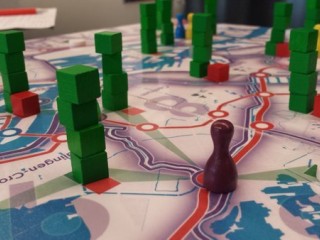Project Results:
Chezo serious gaming hub
Pre-phase
About the project
Planning processes in the water and urban planning are nowadays accompanied by ICT, role plays, and simulations to stimulate participative and informed decision taking. Serious gaming is a new development for awareness creation, negotiation and planning for water related issues. This project introduced these supporting approaches in Kenya, that is seen as one of the most advanced and innovative minded countries in Africa. The project was meant as a demo with a possible follow-up with some developed games and inspiration for others.
Key results
-
Three games were developed by three different groups: 2 board games, 1 video game, all in test status.
-
Over 100 people with strong interest in gaming were trained.
-
Workshop sessions and hackathons for different group of users, students and ICT developers.
Tips for the future
- Give sufficient attention to bring the games to the market.
-
If games relate to a felt need they are probably more effective.
-
A clear local ‘landing partner’ can lift a project like this out of the demo stage.
Potential for growth
A partner who feels full ownership could be able to launch the games properly. Serious gaming has potential to be used at policy level.
Project partners
UPANDE, Deltares, FloodCom, The Barn, iHub Kenya
Period
2016 – Mid 2017
Location
Nairobi, KenyaLast project updates
Background
Serious Games are used to create stories, experiences and interactions in order to achieve new insights and skills. Several sources describe potential benefits of serious gaming, of which Marketsandmarkets give the following: “Potential benefits of serious games include improved self-monitoring, enhanced problem recognition and problem solving abilities, and increased social skills such as collaboration, negotiation, and decision making” (marketsandmarkets, 2015)
To create a setting like this requires a diverse combination of disciplines; data modelling, game design, education, art, and knowledge from subject matter experts.
The practices of developing and using serious gaming in water related subjects has been proven successful and used many times in history. Water managers, levee inspectors, engineers, governmental agencies and students from all over the world have been trained using serious gaming. Some examples of current water related games are Levee Patroller, Aqua Republica, the Flood Control game and the Sustainable Delta Game.
Using data models in serious games to simulate complex processes like climate change or socio economic developments, together with 3D visualisation and advanced computer graphics allows realistic and immersive environments to be created. Data systems can also be simulated in board or card games allowing for an easy way to explain complex processes.
Project Plan
The objectives of Chezo Serious Gaming Hub Kenya will be achieved by carrying out a series of activities, namely:
- Kick-off event
- Serious gaming start-up workshop
- Train-the-trainer workshop
- Game Jam
- Collaborative project
- End meeting
All activities below will be posted consistently on a variety of social media platforms in order to generate interest and participation. This will be achieved mostly through the local partner’s social media pages, but also through the VIA Water forum. Upande and iHub have connections with the universities in the region; these connections will be used to get in contact with students to get them involved in the project.
Target group
Through this initiative we will be able to nurture serious gaming concepts among young entrepreneurial minds while at the same time assist in the development of new insights that would transform the sector. These young entrepreneurs know the area; understand the problems in the area and regional culture, together with the social-technical aspect of gaming this will guide to opportunities in the future.
Sustainability
The aim of the project is to not stop with workshops and game jams after the project activities have been completed. During the project the consortium partners will track/refine/identify new ways to keep the momentum going by continuing to create demand.
After the project we hope that serious games will be a part of an annual training amongst water stakeholders like the NCWSC (Nairobi City Water and Sewerage Company), the serious game format is expected to be used for many years. Lessons learnt during the project in terms of announcing events, facilitating workshops, ensuring the right participation, getting the content right, setting realistic and non-prohibitive costs, will prove to be value insights in determining future events which will involve as many consortium partners as possible.
If the model for Nairobi and Kenya has been setup correctly, the option of expanding this concept to other countries is very promising. Several of the consortium partners are already working internationally and the serious game element could be incorporated into those and new networks easily.
Overview of Goals
- Initiate a serious gaming industry
- Use serious games to solve problems/create awareness for (urban) water related issues with different stakeholders, ranging from professionals to students
- Develop curriculum materials for further dissemination of the concepts/opportunities
Results and indicators
- Kick off Event
- Water experts
- Kenyan water experts present at the kickoff
- Startup Workshops
- Workshop participants
- Number of participants to the startup workshop
- Train the trainer workshops
- Game Jam
- Teams
- The Game Jam is for established and aspiring game developers (programmers, game designers, artists, etc.) who are eager to try out their skills in a controlled,competitive and fun setting. Participants can be both students and professionals.
- Collaborative Project
- Final Serious Game Concepts and business plans
- We are looking to award seed grants to the 3 best water related serious game concepts developed during the Game Jam.

